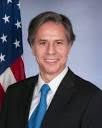By — Shyamal Sinha
Antony John Blinken is an American government official and diplomat serving as the 71st United States secretary of state since January 26, 2021. He previously served as deputy national security advisor from 2013 to 2015 and deputy secretary of state from 2015 to 2017 under President Barack Obama.
China on Thursday reacted angrily to US Secretary of State Antony Blinken’s meeting with a senior representative of the Tibetan spiritual leader Dalai Lama in New Delhi, saying it is a violation of Washington’s commitment acknowledging Tibet as part of China and not to support Tibetan independence.
Blinken on Wednesday met Ngodup Dongchung, an official in the Tibetan government-in-exile and representative of the Dalai Lama, in a clear signal to China about the Biden administration’s continued support to the Tibetan cause.
In the meeting, Dongchung thanked Blinken for the continued support by the US to the Tibetan movement.
When asked, a spokesperson of the US State Department told PTI, ‘Secretary Blinken had an opportunity to meet briefly this morning in New Delhi with a representative of His Holiness the Dalai Lama, Central Tibetan Administration Representative Ngodup Dongchung.’ Separately, another Tibetan representative, Geshe Dorjee Damdul, attended a roundtable Blinken held with around seven civil society members.
Asked for his reaction by the official media here at a press briefing, Chinese Foreign Ministry spokesman Zhao Lijian said, ‘Tibetan affairs are purely China’s internal affairs that allow no foreign interference”.
‘The 14th Dalai Lama is by no means just a religious person but rather a political exile who has long been engaged in anti-China separatist activities attempting to split Tibet from China,’ he said.
China firmly opposes all forms of contacts between foreign officials and the Dalai Lama, he said.
‘Any formal contact between the US and the Dalai clique is a violation of the US commitment to acknowledge Tibet as part of China”, not to support Tibetan independence and attempts to separate it from China, he said.
‘We urge the US to honour its commitment to stop meddling in China’s internal affairs under the pretext of Tibetan affairs, and offer no support to Tibet independence forces to engage in anti-China separatist activities. China will take all necessary measures to defend its own interests,” he said.
China comes up with such routine reactions whenever foreign dignitaries and officials meet the Dalai Lama or his representatives.
The 14th Dalai Lama has made India his home since fleeing his Tibetan homeland in 1959.
The Chinese government officials and the Dalai Lama or his representatives have not met in formal negotiations since 2010.
Beijing has in the past accused the 86-year-old Dalai Lama of indulging in ‘separatist’ activities and trying to split Tibet and considers him as a divisive figure.
Another US official, who briefed reporters on condition of anonymity, said: “The Dalai Lama obviously is a globally revered spiritual leader and so the gesture was gratefully received and appreciated.”
The people cited above said the meeting was being seen as a strong signal of support for the Dalai Lama and was also significant as it was held in India at a time when New Delhi and Beijing are locked in a standoff along the Line of Actual Control (LAC).
However, the Tibetan spiritual leader has insisted that he is not seeking independence but ‘genuine autonomy for all Tibetans living in the three traditional provinces of Tibet’ under the ‘Middle-Way approach’.
Blinken arrived in India on Tuesday on a maiden two-day visit with an extensive agenda featuring the rapidly evolving security situation in Afghanistan, boosting Indo-Pacific engagement and ways to enhance COVID-19 response efforts among others.
According to the US State Department, Antony Blinken’s trip to New Delhi is meant to reaffirm the United States’ commitment to strengthening bilateral ties with India.












